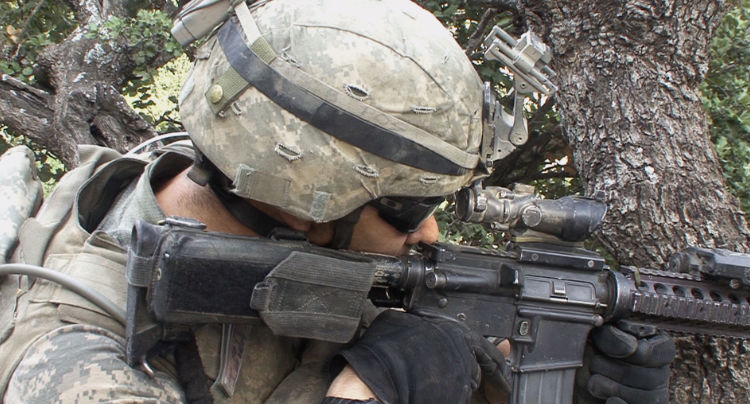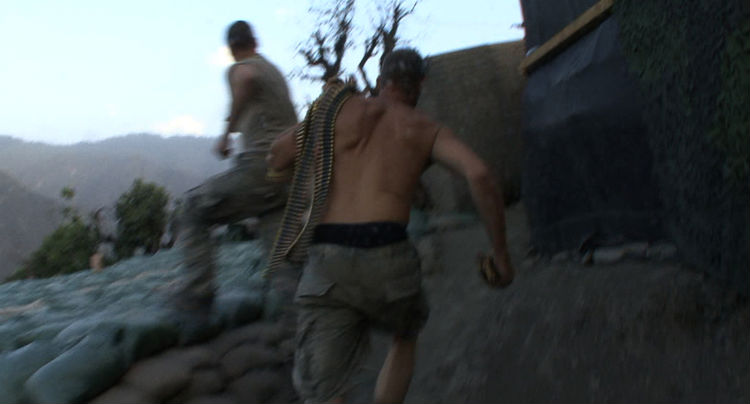
As absorbing as its predecessor, if not as emotionally powerful.

As absorbing as its predecessor, if not as emotionally powerful.
One of the greatest films about war of all time, 2010’s gripping documentary Restrepo, co-directed by Sebastian Junger and the late Tim Hetherington (who was killed covering the Libyan civil war in 2011), brought attention to the conflict in Afghanistan like no piece of media we’d yet seen. It embedded us not just in the Korengal valley, where the brave, young American soldiers laid their lives on the line, but inside their heads, where their minds were ravaged and pushed to the breaking point by the ever-present threat of sudden death. Shocking footage made Restrepo a harrowing experience, but Junger’s follow-up, Korengal, delves deeper into the battered psyches of the same young men in the 2nd Platoon of Battle Company and isn’t as concerned with illustrating the dangers surrounding their encampment. It’s a documentary entirely made up of leftover footage from its predecessor, and yet it feels essential, a unique portrait of the wartime experience.
Unforgettable footage of a soldier sobbing uncontrollably after watching his friend and platoon mate die by his side was one of Restrepo‘s key moments, a dark vision of war that’s shocking to civilians, woefully familiar to intrepid hearts who spent time in Afghanistan. In Korengal, we’re presented another perspective on firefights entirely, with the soldiers each professing that exchanging fire with the enemy is one of the most enjoyable things they did in their 15-month deployment in Korengal Valley. When we see them spending their days either patrolling or sitting around, waiting to get shot at (which happened several times a day), one can imagine firing a giant gun back at the men trying to kill you would at the very least break up the monotony. These men made the most of their situation and learned to enjoy the danger, something some most of us may not be able to fully understand.

The biggest stylistic difference between the two films is that Korengal is more reflective, less in the moment. The sit-down interviews with the soldiers explore the mad juxtaposition of the boredom they experienced in Restrepo (their outpost, named after a comrade killed in action) and the hell that hung in the air, ready to cave in on them at any moment. They’re forced to have a little fun to keep their sanity–they play Rock Band, they have impromptu rock fights, they watch sexy music videos, and they even tattoo each other. And still, they’re ready to leap behind cover at a moment’s notice. To paint a picture of the constant urgency, one of the soldiers admits that he’s mentally planned exactly where to jump behind cover even at that moment, as he’s being interviewed.
Daily life in the war zone must be a strange, unnatural thing, which is what Junger attempts to encapsulate. Only those who were in the Valley truly know if he was successful in this, but as an outsider, the film is as absorbing as its predecessor, if not as emotionally powerful. It’s easy to get swept up in the gruesome, visceral terror of Restrepo, but Korengal offers up a more meditative experience, giving us more to ponder. The boys were living in the most hellish of situations, and yet, the kinship they forged is one so strong that they’ll likely never find another to compare. One soldier, speaking of regret of taking lives, admits to despising when people attempt to console him with the words, “You did what you had to do.” He asserts with real anger, “I hate that comment. I didn’t have to do any of it.” The complexity of his inner-struggle represents everything that is fascinating about Korengal.
Junger uses a less verité style of filmmaking here, utilizing a more traditional journalistic structure. There are clearly delineated, less acts, each like a separate chapter, which gives us more time to think rather than constantly being on edge, ready to react. There isn’t a long narrative arc to speak of, but the change of pace helps to distinguish it from Restrepo, a film it makes no attempt to top in terms of drama. Korengal, at its best, helps us begin to understand what goes on in the heads of these brave young men, which ultimately makes our respect for them run even deeper.